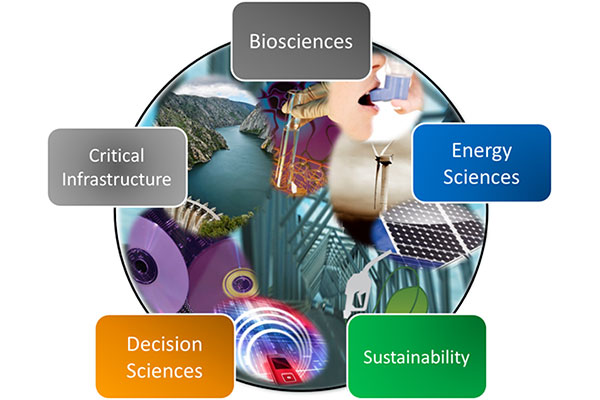Two years into their work, leaders of the Dean’s Research Initiatives (DRIs) presented their progress in an open forum held April 22.
In 2011, the College of Engineering established the initiative and awarded $500,000 to three interdisciplinary teams to help the groups pursue larger funding opportunities in important research areas.
Initiative for a Carbon Negative Economy
Over the past year, the Initiative for a Carbon Negative Economy continued to look for large grant opportunities in the quest to have “economic prosperity without greenhouse gas emissions.” The group is working to establish a way to use biomass pyrolysis and its byproducts—especially biochar, a carbon-rich material that results from burning feedstock—for energy, while also removing carbon dioxide from the atmosphere by sequestering it into the biosphere.
Robert Brown, Anson Marston Distinguished Professor of Engineering, Gary and Donna Hoover Chair in Mechanical Engineering, Iowa Farm Bureau director of the Bioeconomy Institute, director of the Center for Sustainable Environmental Technologies, and professor of mechanical engineering, chemical and biological engineering, and agricultural and biosystems engineering, along with David Laird, professor of agronomy were on-hand to discuss the initiative’s current progress.
In addition to funded research projects, the group is establishing key partnerships. Collaborating with Harry Stine, president and founder of the Stine Seed Company located in Adel, Iowa, the team will use Stine’s fast pyrolyzer to run experiments to create biochar. Stine will also provide the feedstock for the experiments.
On campus, the group is teaming up with the Iowa State University Power Plant to use biochar to generate energy for the university, which will provide insight into the material’s potential. Brown is encouraged this project will move forward, especially since initial investigations indicate the university’s boilers won’t need to be retrofitted to use the biochar.
While expanding research remains a priority for the initiative, Brown acknowledged that a large responsibility of the group is to gain support and recognition for biochar and conveying the economic benefits of the carbon negative energy model.
Wind Energy Initiative
Continuing to position the university as a global leader in the national effort to increase wind energy production, the Wind Energy Initiative fine-tuned and expanded an already strong research and educational program. Sri Sritharan, Wilson Engineering Professor, gave an update on the group’s success at advancing wind energy.
Sritharan highlighted headway engineers and scientists made within the initiative’s eight research thrusts. Some examples of their work include projects developed to assess different approaches to characterize and forecast wind resources; improve manufacturing processes; understand the wake interference of multiple wind turbines; present new ideas for taller towers and health monitoring of critical components; and address integration of wind power into grid and transmission.
Within the initiative’s educational component, more courses in wind energy were added to support the minor. The PhD program will increase by five more students this fall, in addition to the six who are currently enrolled. The team is also working on renewing the Wind Energy Science, Engineering, and Policy (WESEP) Research Experiences for Undergraduates (REU), sponsored by the National Science Foundation.
A highly collaborative group, members of the initiative are working on developing a cooperative research center with three other university partners. Additionally, the group has been busy with outreach efforts, including an open house held at the end of April and tours like the one given to U.S. Rep. Steve King in early May.
Moving forward, the group will continue investigating ways to make land-based and offshore wind energy more competitive through reducing capital costs; minimizing operation and maintenance costs; increasing energy capture; and improving grid integration.
High Throughput Computational Biology Initiative
Srinivas Aluru, Ross Martin Mehl and Marylyne Munas Mehl Professor of Computer Engineering, shared several major successes for the High Throughput Computational Biology Initiative, which aims to advance research in modern computational genomics and systems biology, a field growing thanks to the increasing prominence of high-throughput instrumentation.
Researchers in the group were awarded several major grants, totaling more than $4 million in funding tied directly to the initiative over the past year. Aluru noted that additional projects closely associated to the initiative also received funding, indicating the rising value of this area of research.
Another good sign of the importance of the group’s work—the White House announced the Big Data Research and Development Initiative to “improve our ability to extract knowledge and insights from large and complex collections of digital data.” Aluru, recognized as a key stakeholder in the field, was invited to attend the White House Big Data Workshop, held May 3.
The group continues taking leadership roles in the field, giving keynote presentations and participating on panels. Members also attended events hosted by groups such as the National Science Foundation and the Department of Energy. Additionally, the initiative gained new collaborative partners, including Stanford and the University of Michigan.
With several large grants pending, the team looks forward to continuing work in this expanding field. Among the excitement, however, Aluru added that the initiative is leaving some areas untouched, and that members are being strategic about approach and direction, focusing on the initiative’s core mission and how to best grow the group.
